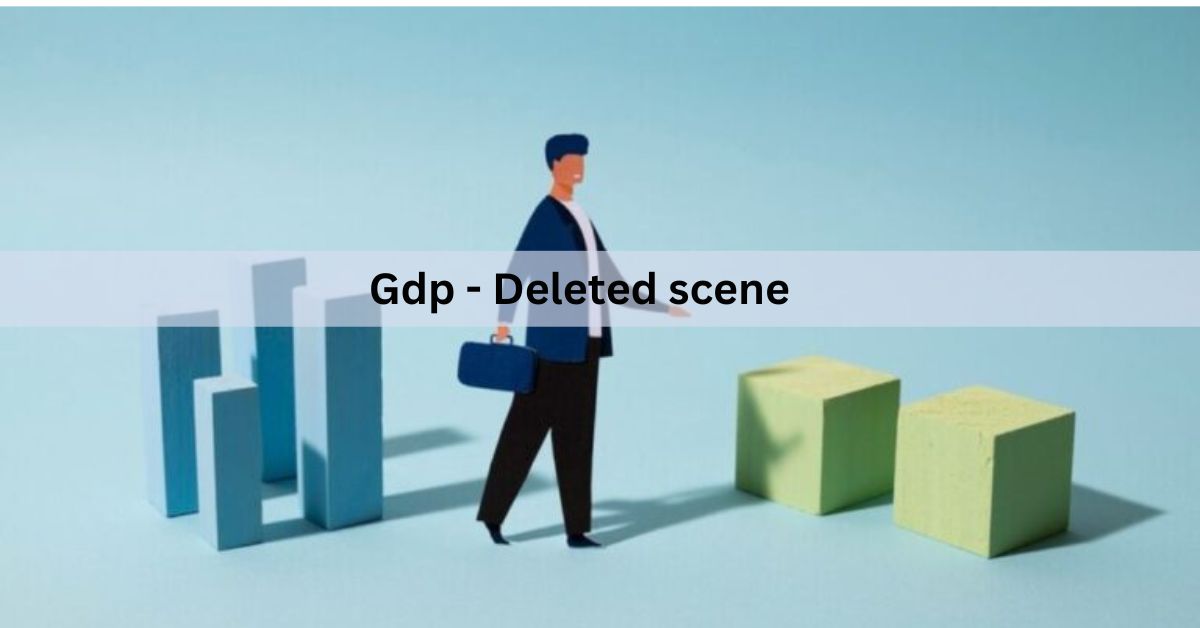While learning about GDP – Deleted Scene – E355, I noticed how important details can be missed, just like deleted scenes in a movie. This new perspective made me rethink how I look at economic data, helping me see the bigger picture and make better financial decisions.
“Gdp – Deleted scene – E355 ” highlights the idea that some important details or data might be left out of economic reports, just like deleted scenes in a movie. It reminds us to look deeper into GDP to understand the full picture of the economy.
We’ll talk about “Gdp – Deleted scene – E355 ” This idea shows how important economic details can be left out, just like scenes cut from a movie. We’ll explore what this means and why it’s important to understand the full economic picture.
What is Gdp – Deleted scene – E355 “?
“Gdp – Deleted scene – E355 ” refers to the idea that important details about economic performance can be left out of standard GDP reports, much like how scenes are cut from movies. This concept helps us see that some key economic factors might not be immediately visible but still affect our understanding of the economy.
By exploring these “deleted scenes,” we can get a clearer and more complete picture of how the economy really works. It encourages us to look beyond the surface and consider the full range of economic influences. Understanding these hidden aspects can lead to better financial decisions and insights.
How does “Deleted Scene” relate to GDP?
The term “Deleted Scene” relates to GDP by highlighting the idea that some important economic details can be omitted from the main GDP reports, just like scenes are cut from a movie. These “deleted scenes” in GDP might include hidden factors or overlooked data that can provide a fuller understanding of the economy.
By examining these missed details, we can gain deeper insights into economic performance and make more informed decisions. It’s like discovering extra layers of a story that were initially hidden, giving us a more complete view of economic trends and impacts. This helps us better understand the true state of the economy.
Why do deleted scenes matter for GDP?
Deleted scenes matter for GDP because they represent the important economic details and data that might be left out of the main reports. Just like deleted scenes in movies can provide extra context or insights into the story, these omitted aspects can reveal a fuller picture of the economy.
By considering these hidden elements, we can better understand economic performance, make more informed decisions, and address factors that might be overlooked in standard GDP analyses.
These insights can highlight economic disparities, uncover hidden trends, and improve overall economic strategies. Understanding these “deleted scenes” ensures we’re not missing crucial information that could impact financial decisions and policy making.
What parts of GDP might be missed?
Parts of GDP that might be missed include:
Informal Economy:
The informal economy includes economic activities that are not officially recorded or regulated, such as work done by street vendors, informal labor, or freelance gigs. These activities contribute to the economy but are often excluded from GDP calculations because they aren’t tracked by official institutions.
Unreported Transactions:
Some economic transactions, especially those involving cash or informal agreements, may not be reported or recorded. Examples include under-the-table payments or informal trades. These unreported transactions can significantly impact the actual economic picture, as they may not be reflected in official GDP figures.
Hidden Costs:
GDP typically measures economic output without considering some hidden costs, such as environmental damage, pollution, or depletion of natural resources. Additionally, unpaid work, such as caregiving done at home, isn’t included in GDP, even though it contributes to overall economic well-being.
Regional Variations:
National GDP figures may mask significant economic differences between regions. Local economies might experience growth or decline differently from the national average, and these variations are often not visible in the aggregated GDP data.
Long-Term Trends:
Short-term GDP data might overlook long-term economic trends and structural changes, such as technological advancements or shifts in demographic patterns. These long-term factors can affect economic health but might not be immediately apparent in periodic GDP reports.
How do hidden factors affect Gdp – Deleted scene – E355?
Hidden factors can affect GDP in several important ways. For example, if informal work or cash transactions are not included, GDP figures might underestimate the true size of the economy. Costs like environmental damage or unpaid work are often left out, which can make economic health seem better than it actually is.
Regional differences might not be visible in national GDP data, leading to policies that don’t address local needs. Also, long-term trends like technological changes might be missed, giving an incomplete picture of economic progress. These gaps can lead to less accurate economic decisions and planning.
Can visuals help explain “Gdp – Deleted scene – E355 “?
Yes, visuals can help explain “GDP – Deleted Scene – E355” by making complex concepts easier to understand. Charts, graphs, and images can show hidden aspects of GDP that aren’t immediately clear from text alone.
They can illustrate missing economic details, like informal transactions or regional differences. Visuals also help highlight how these omitted factors impact the overall economic picture. By providing a clearer view, they make it easier to grasp the full scope of what might be left out in traditional GDP reports.
Which ways do hidden GDP factors affect policies?
- Misguided Policies: If hidden factors are not considered, policies may be based on incomplete data, leading to ineffective or misguided decisions. This can result in strategies that fail to address the real economic issues at hand.
- Inequitable Resource Allocation: Ignoring regional economic variations can result in resources being allocated unevenly, failing to address local needs. Some regions may receive more support than necessary, while others may be left behind.
- Overlooked Economic Issues: Hidden costs, like environmental damage or unpaid work, can mask underlying economic problems that need to be addressed. This can prevent policymakers from tackling critical issues that affect overall economic well-being.
- Inaccurate Economic Planning: Long-term trends that are not included in GDP data can lead to poor long-term economic strategies and planning. This can hinder the ability to prepare for future economic changes or challenges.
- Skewed Economic Support: Policies might support sectors or areas that don’t truly need it, while neglecting areas that are actually facing hidden economic challenges. This can result in inefficient use of resources and missed opportunities for targeted support.
What can we learn from “Gdp – Deleted scene – E355 ?
Exploring “deleted scenes” can teach us about the hidden aspects of economic data and the broader context behind GDP figures. We can uncover missing details, understand overlooked issues, and gain insights into how these gaps affect economic policies and planning. It also helps in recognizing the full scope of economic activity and the implications of omitted factors.
Additionally, it can reveal how certain data might be intentionally or unintentionally excluded and how this influences public perception and decision-making. By examining these gaps, we can better address real-world economic challenges and create more effective solutions.
How does this idea apply to global economics?
Applying the idea of “deleted scenes” to global economics can provide a more nuanced understanding of international financial dynamics:
- Revealing Hidden Economies: Recognizing informal or unreported economic activities in different countries can offer a clearer picture of global economic health and potential growth areas.
- Understanding Regional Variations: It helps identify regional disparities and how overlooked factors influence different economies, leading to more balanced global economic policies and trade strategies.
- Improving Global Forecasts: By including hidden data in economic analyses, global forecasts can become more accurate, helping businesses and governments make better decisions in an interconnected world.
- Addressing Global Challenges: Acknowledging missing factors like environmental costs or social impacts can lead to more comprehensive solutions for global issues such as climate change and inequality.
- Enhanced International Cooperation: Understanding the full scope of economic activities across borders fosters better international cooperation and policy-making to address shared economic challenges.
FAQs:
What does “Gdp – Deleted scene – E355 ” mean in global economics?
“Deleted scenes” refer to overlooked or unreported aspects of economic data. Recognizing these gaps helps provide a fuller understanding of global financial dynamics.
How can hidden economic activities impact global forecasts?
Hidden economic activities can distort forecasts by omitting significant data. Including these factors leads to more accurate predictions and better financial decisions.
Why is it important to understand regional economic variations?
Understanding regional variations helps address disparities and tailor economic policies. It ensures that strategies and investments are more effective across different areas.
How can acknowledging unreported data improve international cooperation?
Recognizing unreported data fosters better international cooperation by providing a complete picture of global economic issues. This leads to more coordinated and effective policy responses.
What benefits come from analysing “Gdp – Deleted scene – E355 ” in economic reports?
Analysing “deleted scenes” reveals hidden risks and opportunities. This comprehensive approach helps in making more informed financial decisions and developing effective policies.
Conclusion:
In conclusion, examining “Gdp – Deleted scene – E355 ” in economic data offers valuable insights into hidden aspects of global economics. By uncovering overlooked factors, we gain a clearer understanding of regional disparities, hidden risks, and unreported activities. This comprehensive approach enhances the accuracy of forecasts, improves policy development, and fosters better international cooperation.
Ultimately, addressing these gaps leads to more informed decisions and more effective strategies for managing the global economy, benefiting both policymakers and investors alike.



